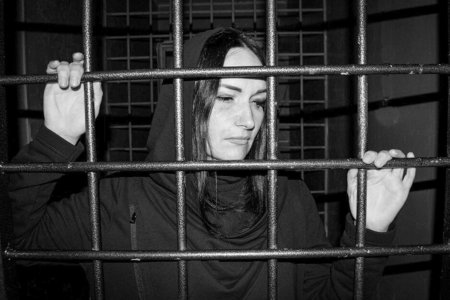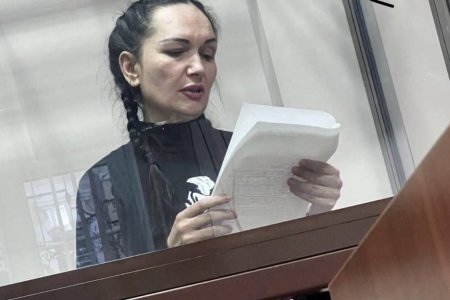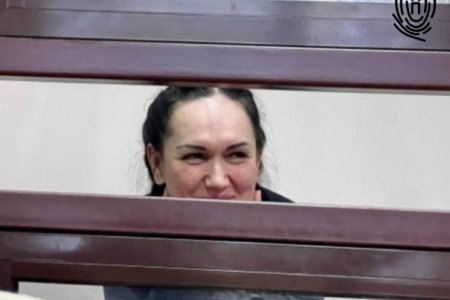
Iryna Danilovych has, thankfully, ended her life-threatening hunger strike, after she was promised a medical examination and treatment. She is, however, in danger of losing her hearing because of the Russian occupation prison’s failure to provide timely medical treatment for an ear inflammation.
Iryna had seen no other alternative but to declare a dry hunger strike on 21 March after suffering acute earache for four months, with the SIZ0 [remand prison] administration ignoring her plea for a medical examination and proper treatment. In her formal statement announcing the hunger strike, she informed that the hearing problems and constant ringing in her left ear had been causing excruciating pain, with the travelling between the SIZO in Simferopol and the occupation ‘court’ in Feodosia exacerbating her torment. As a nurse, Danilovych was aware and expressly warned that her symptoms could indicate a micro-stroke.
Russia has already tortured one political prisoner, Dzhemil Gafarov, to death and is now directly jeopardizing the life of another, Amet Suleimanov. It was, therefore, some relief that the SIZO did, at least, agreed on 6 April to Danilovych’s entirely legitimate demands and she felt able, therefore, to end her hunger strike.
Bronislav Danilovych was allowed a brief visit on 8 April and says that his daughter is still in a poor state and is suffering from acute earache, headaches and problems with coordination. Although promised a medical examination immediately, this was still delayed, with the fault, he says, lying with Natalia Kulinskaya, the ‘judge’ from the occupation ‘Feodosia municipal court’ who, on 28 December 2022, sentenced Iryna to seven years’ imprisonment on manifestly fabricated charges. The movement between the SIZO in Simferopol and the ‘court’ in Feodosia is in order to read the file material in the case before the appeal hearing against this sentence. Bronislav Danilovych is convinced that Kulinskaya deliberately scheduled the visit to clash with the day that the SIZO had planned to take Iryna to hospital.
Kulinskaya has now also prevented Iryna from fully acquainting herself with the files and has passed them to the ‘court of appeal’. There was no legitimate reason for such haste, especially since Danilovych has been complaining for months of her worsening physical state which made it near impossible to concentrate on the material.
Danilovych was, finally, taken to hospital where she was examined by a doctor who issued a referral to specialists, and prescribed a range of additional medical measures. These, however, were not provided that day and she was simply taken back to the SIZO. According to information received by CrimeaSOS, there is a 50% chance that Iryna will lose her hearing due to the failure to provide proper treatment.
The 43-year-old nurse, civic journalist and human rights defender, has been in Russian captivity since 29 April 2022. She was effectively abducted by FSB officers that morning and held incommunicado, in a basement, for a week before being formally detained on 7 May. During that time, she was tortured and threatened, with the FSB trying to force her to ‘confess’ to entirely fictitious contacts with foreign organizations and to so-called ‘state treason’. When they realized that she would not break, they claimed to have ‘found’ explosives in her glasses case (under Article 222.1 § 1 of Russia’s criminal code).
As her subsequent ‘trial’ ended, Iryna explained that she had initially believed that she was to be the latest victim of the enforced disappearances that she knew all too much about through her human rights work. It is, in fact, possible that this was the plan, and that it was the alarm raised over the abduction of a well-known civic journalist, human rights defender and medical trade union representative that prompted the FSB to change direction.
They came up with preposterous charges which they did not even try to make credible. There were evident incongruities in the case, such as the fact that an entire volume of the material was devoted to her media interviews, although the charges were supposedly laid merely because of some explosives ‘found’ in a glasses case a week after she was taken prisoner by the FSB. No attempt was made to explain why she had allegedly been carrying explosives in a glasses case while working a night shift at a Feodosia clinic.
Despite the evident lies told by the FSB and lack of any credible proof, prosecutor Dmitry Lyashchenko (working with Yulia Matvyeya) demanded an extremely harsh seven-year sentence (and 60-thousand rouble fine). This was provided in full by Natalia Kulinskaya, who merely cleaned up the paperwork by excluding the totally incomprehensible part in the indictment about the supposed procurement of the explosive. It was unclear how Iryna was supposed to have obtained the explosive; why she had allegedly carried it in her glasses case to work; why she had ‘voluntarily’ chosen to be illegally held incommunicado and tortured by the FSB and why the case material contained ‘evidence of dissident views’, not of any activities involving explosives. The FSB have learned over the last nine years that, effectively, any level of lawlessness will be tolerated in occupied Crimea, with Kulinskaya & Co. unfortunately proving them right.



